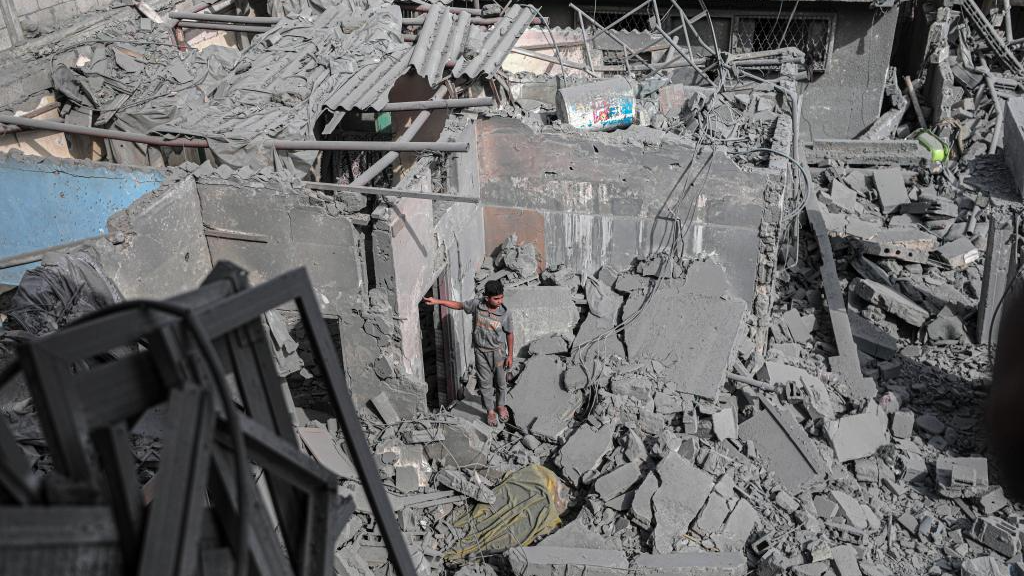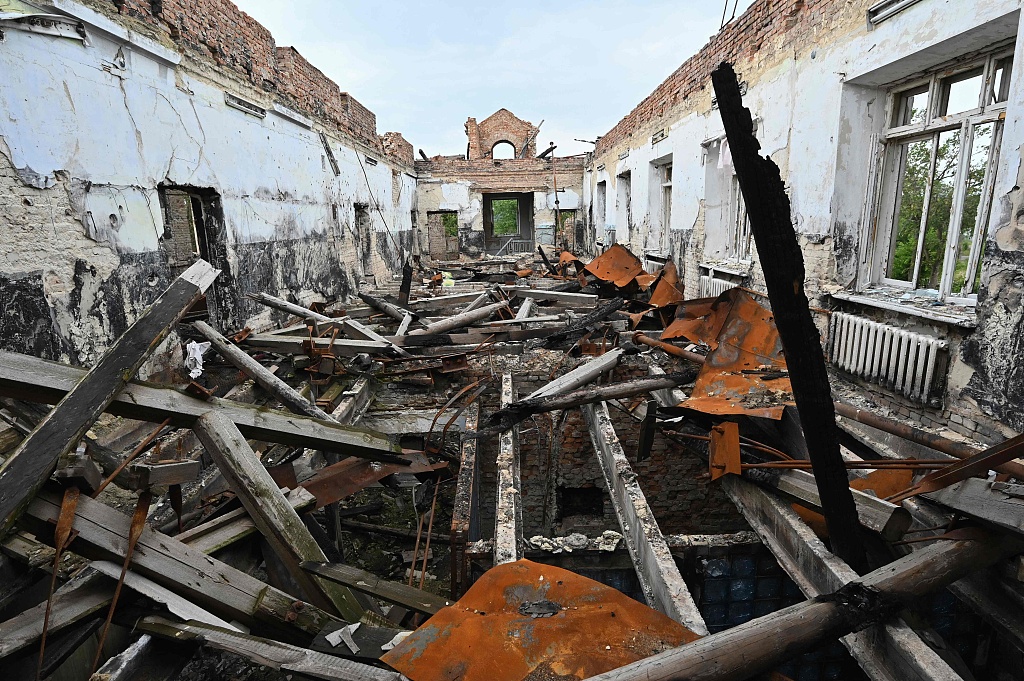
A boy stands among the rubble of buildings destroyed in an Israeli bombing at Bureij refugee camp in central Gaza Strip, November 13, 2023. /Xinhua
A boy stands among the rubble of buildings destroyed in an Israeli bombing at Bureij refugee camp in central Gaza Strip, November 13, 2023. /Xinhua
Editor's note: Mariam Shah, a special commentator on current affairs for CGTN, is an Islamabad-based independent researcher in the field of conflict studies and military psychology. The article reflects the author's opinions and not necessarily the views of CGTN.
November 20 is World Children's Day but amid the chaos of conflict in Gaza and Ukraine, where the children, being the most vulnerable, are caught in the crossfire of war.
War inflicts deeper wounds than mere flesh; it engraves traumatic imprints on the fragile souls of children, scarring their innocence and impacting their lives forever. The narrative of conflict often overshadows the silent victims, which are the innocent children robbed of their childhood. The psychological wounds inflicted by war's traumatic events run deeper and leave a permanent mark, shaping the entire lives of children who witnessed the horrors and uncertainties.
Conflict and children
Recent conflicts have involved fighting within highly populated urban areas where large civilian and child populations got involved. As per a report released by the UN International Children's Emergency Fund, global conflict, violence, and other crises left nearly 36.5 million children displaced from their homes at the end of 2021 – the highest number recorded since World War II. These figures do not include children displaced by climate and environmental disasters or those newly displaced between 2022 to 2023.
A recent study highlights a concerning global trend: an escalating burden on children and women due to armed conflicts. In 2017, approximately 630 million women and children – 10 percent of women and 16 percent of children worldwide – were displaced by or living perilously close to conflict zones. Shockingly, nearly half a billion children, or about one in six globally, are growing up in regions experiencing political violence or armed conflict.
Psychological scars of conflict
The prolonged exposure to war and constant uncertainty means the children are in a state of "toxic stress," especially in regions like Gaza, Afghanistan, Syria, Yemen, Ukraine, and many other war-torn countries that share the same experiences of loss and destruction.
Globally, children residing in conflict zones endure bombings, starvation, loss of loved ones, and the destruction of essential infrastructures like schools and hospitals. Their struggle starts with the uncertainty of each passing day. They see unexplainable horrors of war, blood, and destruction, and all these have a detrimental effect on their long-term well-being.

A school is destroyed by aircrafts in the village of Kupiansk-Vuzlovyi, Kharkiv, Ukraine, June 28, 2023. /CFP
A school is destroyed by aircrafts in the village of Kupiansk-Vuzlovyi, Kharkiv, Ukraine, June 28, 2023. /CFP
Since children are still developing their coping mechanisms, they may struggle to regulate their emotions, leading to outbursts of anger, anxiety, and loneliness. These experiences also hinder typical emotional and cognitive development in affected children. Various studies have shown the consequences of war exposure on the mental health of these children.
Unfortunately, despite the sheer importance of the well-being of children amidst conflict, it is often overlooked in both care and research. In a study published last year on the impact of conflict on Palestinian children, it was found that children who did survive the wars do not emerge unharmed and can pay a high price psychologically, emotionally, and behaviorally.
As per another research, children aged five to 12 during wartime face significant challenges in readjusting to post-war life. Exposure to war-related violence strongly correlates with symptoms of post-traumatic stress disorder. Moreover, the depressive symptoms are primarily linked to stressors related to displacement. Importantly, failing to address traumatic responses may have long-term consequences, hindering children's ability to function well in social, academic, professional, and personal aspects of life.
In armed conflicts, children often bear the most lasting scars, carved not only on their bodies but imprinted on their minds and souls. The children who grew up in conflict-ridden environments like Gaza and Syria are unfortunately expected and compelled to face a reality that demands bravery, strength, and resilience beyond their years. Instead of experiencing a typical childhood, these children are forced into life's realities too early. These children should be able to enjoy childhood innocence, unburdened by the demands of life beyond their years.
Unfortunately, the more urgent the need to address this issue, the more frequently it tends to be neglected.
What needs to be done?
It is crucial to recognize the profound impact of conflict on the mental health of children and take measures to support their mental well-being. There is an urgent need for a global paradigm shift, urging policymakers, humanitarian organizations, and the international community to prioritize the mental well-being of children affected by conflict. It's our shared responsibility to talk about the mental health of these vulnerable children.
It is imperative to counter the societal stigma surrounding mental health in war-torn regions. This can include providing access to mental health services, creating safe spaces for children to express their emotions, and promoting peace-building efforts to prevent future conflicts.
But more than anything, it is high time to talk about dialogue instead of war and confrontation. No psychological intervention can undo trauma suffered by children, nor can it provide a solution. The world needs justice and peaceful political resolutions of armed conflicts.
(If you want to contribute and have specific expertise, please contact us at opinions@cgtn.com. Follow @thouse_opinions on Twitter to discover the latest commentaries in the CGTN Opinion Section.)



